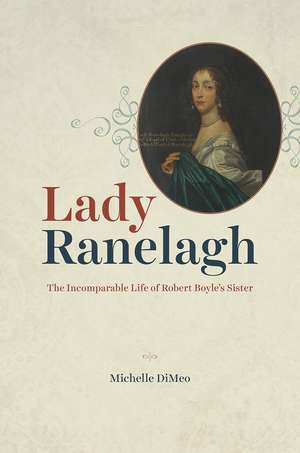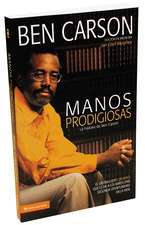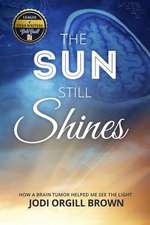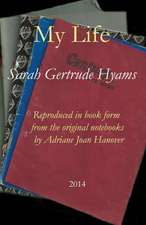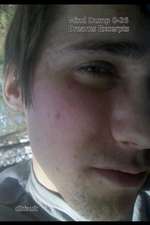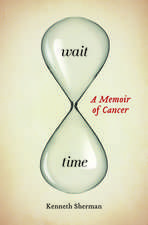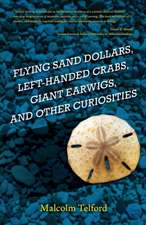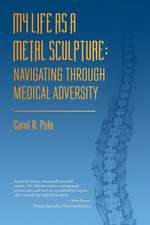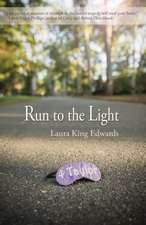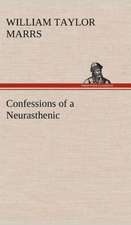Lady Ranelagh: The Incomparable Life of Robert Boyle's Sister: Synthesis
Autor Michelle DiMeoen Limba Engleză Hardback – 19 mai 2021
Philosophers, mathematicians, politicians, and religious authorities sought her opinion on everything from decimalizing the currency to producing Hebrew grammars. She practiced medicine alongside distinguished male physicians, treating some of the most elite patients in London. Her medical recipes, political commentaries, and testimony concerning the philosophers’ stone gained international circulation. She was an important influence on Boyle and a formidable thinker in her own right.
Drawing from a wealth of new archival sources, Michelle DiMeo fills out Lady Ranelagh’s legacy in the context of a historically sensitive and nuanced interpretation of gender, science, and religion. The book re-creates the intellectual life of one of the most respected and influential women in seventeenth-century Europe, revealing how she managed to gain the admiration of diverse contemporaries, effect social change, and shape contemporary science.
Preț: 334.40 lei
Nou
Puncte Express: 502
Preț estimativ în valută:
63.100€ • 66.11$ • 53.26£
63.100€ • 66.11$ • 53.26£
Carte disponibilă
Livrare economică 04-18 martie
Livrare express 15-21 februarie pentru 37.78 lei
Preluare comenzi: 021 569.72.76
Specificații
ISBN-13: 9780226731605
ISBN-10: 022673160X
Pagini: 296
Ilustrații: 10 halftones
Dimensiuni: 152 x 229 x 33 mm
Greutate: 0.51 kg
Ediția:First Edition
Editura: University of Chicago Press
Colecția University of Chicago Press
Seria Synthesis
ISBN-10: 022673160X
Pagini: 296
Ilustrații: 10 halftones
Dimensiuni: 152 x 229 x 33 mm
Greutate: 0.51 kg
Ediția:First Edition
Editura: University of Chicago Press
Colecția University of Chicago Press
Seria Synthesis
Notă biografică
Michelle DiMeo is the Arnold Thackray Director of the Othmer Library at the Science History Institute in Philadelphia. She is the coeditor, with Sara Pennell, of Reading and Writing Recipe Books, 1550-1800.
Cuprins
List of Illustrations
Note on Conventions
Note on Conventions
Introduction
1 Birth, Childhood, and Marriage (1615–42)
2 Early Days in the Hartlib Circle (1642–48)
3 Formative Years in Natural Philosophy and Medicine (1649–56)
4 Return to Ireland (1656–59)
5 Death of the Hartlib Circle and Birth of the Royal Society (1658–67)
6 Plague, Providence, and Medical Practice (1665–67)
7 Robert Boyle Moves In (1668–90)
Conclusion: Death and Legacy
Acknowledgments
Appendix: Boyle Family Genealogy
Notes
Bibliography
Index
Appendix: Boyle Family Genealogy
Notes
Bibliography
Index
Recenzii
"DiMeo reveals Katherine Jones, Lady Ranelagh, as central to political, religious, philosophical and medical discussions, yet destined to be forgotten, because she obeyed the convention that women should not put their thoughts into print. DiMeo . . . has used her archival skills to trawl the papers of Ranelagh's mostly male contemporaries to uncover her role as a public intellectual. . . . DiMeo is scrupulous in tethering her observations to their archival sources. . . . That [Ranelagh's] story is gathered from the papers of her male relatives and associates highlights how easy it is for women to fall through the cracks of history."
"Ranelagh's works were never published nor were her manuscripts preserved . . . . To address this, historian Michelle DiMeo has written the first full-length biography of Ranelagh by gleaning details of her life from her correspondence and the archives and writings of her relatives and contemporaries. The result is a detailed account of this notable woman, her work, and her close, collaborative relationship with her brother Robert—set against the backdrop of the turbulent politics of the times, including the Irish and English civil wars."
"In Lady Ranelagh: The Incomparable Life of Robert Boyle’s Sister, Michelle DiMeo adroitly weaves together the extant evidence to bring this spectral figure to life. . . Through her careful reconstruction, DiMeo’s study shows, perhaps more fully than any extant volume, how a well-positioned seventeenth-century woman, who was formally excluded from the Church, universities, and Royal Society, could have a quiet say over the political and scientific direction of a nation."
"With this timely intellectual biography of the incomparable Lady Ranelagh, DiMeo presents a powerful portrait of an impressive intellectual figure and most remarkable woman, whose importance in the intellectual and scientific life of seventeenth century Britain went far beyond being Robert Boyle’s supportive and beloved sister."
"For almost 400 years, it has been a struggle to find the right words to describe Katherine Jones, Lady Ranelagh. . . . In this engaging and deeply researched study, Michele DiMeo has taken up the gauntlet, and finally done justice to Lady Ranelagh. Choosing an approach that seems to cycle in and out of style in the history of science – that of the intellectual biography – DiMeo has captured Ranelagh as she moved through tumultuous times for nation, faith, and natural philosophy. And what emerges is a woman who occupied a place of respect in all of these, someone whose piety was unquestioned despite the personality that meant she was often ‘bold, sarcastic, and outspoken’ (p. 3)."
"Lady Ranelagh was one of the most remarkable women of her day, and it is wonderful at last to have a book-length study of her. DiMeo meticulously weaves together the fragmentary surviving sources to provide a clear and convincing picture of a truly great figure. She illustrates the extraordinary range of eminent peers on whom Lady Ranelagh had real influence, throwing especially important light on her role in the emotional and intellectual development of her brother, the scientist Robert Boyle. Some of the most telling passages in the book deal with Lady Ranelagh's medical expertise, where she benefited from the lack of clear demarcation between professional and lay practice at the time. DiMeo also has important things to say about the significance of gender in intellectual life, illustrating how a woman like Lady Ranelagh retained an unexpectedly significant role behind the scenes, albeit one subsequently largely effaced. In all, this lucid and revealing biography is indispensable."
"This is a thorough and carefully considered intellectual biography which will become a mainstay for those seeking to learn about 'philosophical' British women of the seventeenth century, at last letting us hear Lady Ranelagh's voice alongside contemporaries like Margaret Cavendish, Anne Conway, and Lucy Hutchinson as well as her famous brother. DiMeo offers a judicious, comprehensive view of the life and thought of her subject."
"In this sensitive and inspiring biography, DiMeo resuscitates from fragmentary and forgotten evidence a leading religiopolitical reformer and strategist during Britain’s civil wars, medical practitioner in a period of transformation, and natural philosopher at the founding of the Royal Society. Lady Ranelagh’s invisibility today, like that of other female intellectuals of the time, is ironically a tribute to her success in this role in the past. Without DiMeo’s sleuthing, Ranelagh’s ideas, arguments, and experiences—hidden in her letters, within her brother’s writings, and in the many dedications acknowledging her collaboration—would be forgotten forever."
"Katherine Jones, Lady Ranelagh, was a remarkable woman who played an important role in the intellectual and political circles of her day. However, the loss of most of her writings has meant that, until now, she has been remembered (if at all) only as the sister of her famous brother, the natural philosopher Robert Boyle. DiMeo's excellent biographical study is a feat of historical detective work and reconstruction, which restores Katherine Ranelagh to visibility as a prominent collaborator and mentor at the center of events in the scientific and political history of seventeenth-century Ireland and England."
"Michelle DiMeo has filled an important gap with this first book-length biography chronicling [Ranelagh's] remarkable life. DiMeo’s book offers fascinatingly novel insights into one of the most important and influential female figures in seventeenth-century Britain and provides a fresh perspective on wider questions within the history of (women in) science. The book also makes significant methodological contributions, helping to advance research on other under-studied and sparsely documented women in science."
